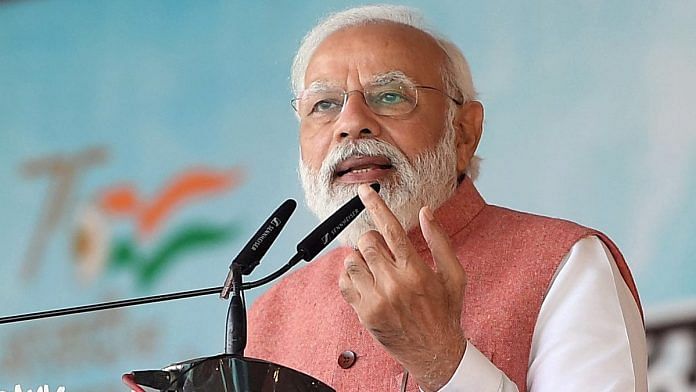Even as markets are limping back to normalcy supported by favourable conditions for manufacturing, sales and fresh offtake of inventories, fears of the new Covid variant Omicron have struck. The panic was fuelled by a lack of knowledge of the new variant, non-availability of prevention and treatment process, and above all the horror of the new variant spinning out of control to assume pandemic proportions.
Traditionally, the Indian economy witnesses growth prospects post-monsoon, which heralds festivities beginning with the third quarter of the year. Farm income fuels spending and spurs rural and urban demand. The despicable coronavirus stalled the economy and threw routine socio-economic life into disarray for over a year.
With great difficulty and due to sheer resilience and ‘never say die’ spirit of the working class and the business community, markets showed buoyancy. The Narendra Modi government, on its part, announced a series of economic packages for the revival of middle- and small-scale industries.
Also read: Even mild Omicron cases could create major new problems
Fresh challenges ahead
Will the new Omicron variant set the clock back and dampen the spirits or pass off without much damage to socio-economic life? It is a question that will remain unanswered for some time now.
Whatever the answer, one thing seems certain: it is not yet time to rejoice, remove face masks and behave as if the Covid pandemic never existed. A total of 73 cases of Omicron have been reported from all over India with Maharashtra reporting the highest number of cases. Based on the experiences of dealing with the coronavirus crisis earlier, health authorities are alert and have been able to quickly detect Omicron cases and track the prospective carriers of the variant.
While people should be made aware of the potential dangers of the new variant, care must be taken not to allow a panic situation to prevail. Any delay in controlling the spread of the virus or slackness in response mechanisms will set in motion a series of consequences beginning from lack of demand, a fall in production to the withdrawal of investments.
Luckily, so far the demand-supply indicators seem to be under control and the overall market sentiment seems to be favourable to growth. The rabi crop sowing process is reportedly in progress and the farm sector does not expect any major negative intervention. According to a report by the Reserve Bank of India (RBI), the aggregate demand conditions indicate a good recovery. “The Indian economy continues to forge ahead, emerging out of shackles of pandemic,” the report said.
The RBI governor’s October report indicates that the “domestic economic activity is normalising after the ferocious second wave retarded momentum. But the economic outlook continues to remain overcast by the future path of the pandemic; the accelerated pace of vaccination and release of pent-up demand to provide an upside to the baseline growth path”.
The report added: “Headline inflation has fallen back into the tolerance band and the trajectory is expected to be driven by supply-side factors. A faster resolution of supply chain disruptions, good foodgrains production and effective supply management could cause inflation to undershoot the baseline, contingent on the evolution of the pandemic and the efficacy of vaccines.”
Also read: What the Crypto crowd doesn’t understand about economics
Can’t leave it to markets
It would be naïve on the part of the Modi government to believe in the RBI and leave the rest of the economic management to the markets alone. Economic revival does not work on the basis of jugaad or Band-Aid solutions. The government will have to control inflation, repair supply chain disruptions and allay fears of pandemic-induced lockdown or clamping of controls over movements.
The Union and state governments have done a commendable job of jabs. It is for the Centre now to revisit the economic packages announced about a year ago, revive the slogan of Atmanirbhar Bharat and make it work instead of spending money on advertising the slogan.
A mere revival of the economy and reaching the pre-pandemic stage should not be the ultimate aim. Much more will have to be done to achieve the target of a $5 trillion economy. Major reforms in the manufacturing, banking, and taxation sectors should be undertaken in such a manner that the reforms are sufficiently insulated from electioneering and political influence to avoid the fate of farm laws. The cryptocurrency challenge and the chip shortage are serious issues that could become economic roadblocks in the immediate future.
On the contrary, a nuanced and balanced approach and seriously facilitating the semiconductor industry will provide a much-needed boost in demand and supply. Thankfully, the Union government has announced a massive capital infusion but micromanagement remains to be addressed.
According to the World Inequality Report, India is among one of the most economically unequal countries with glaring income inequality. A large number of the economically backward population also suffers from health issues ranging from chronic to immune deficiency making them more vulnerable to loss of job, lower production, and higher spending on health and medicine.
However, regardless of how socialistic a government is, it is nearly impossible to provide free and/or affordable medical facilities to a very large population. An important lesson of the Covid pandemic is that issues related to public health, immunity building, and malnutrition need much more focussed attention, investment, participation of the private industry, and above all a unified approach. Not everything can be left to one ministry or a few experts.
The author is the former editor of ‘Organiser’. He tweets @seshadrichari. Views are personal.
(Edited by Prashant)



